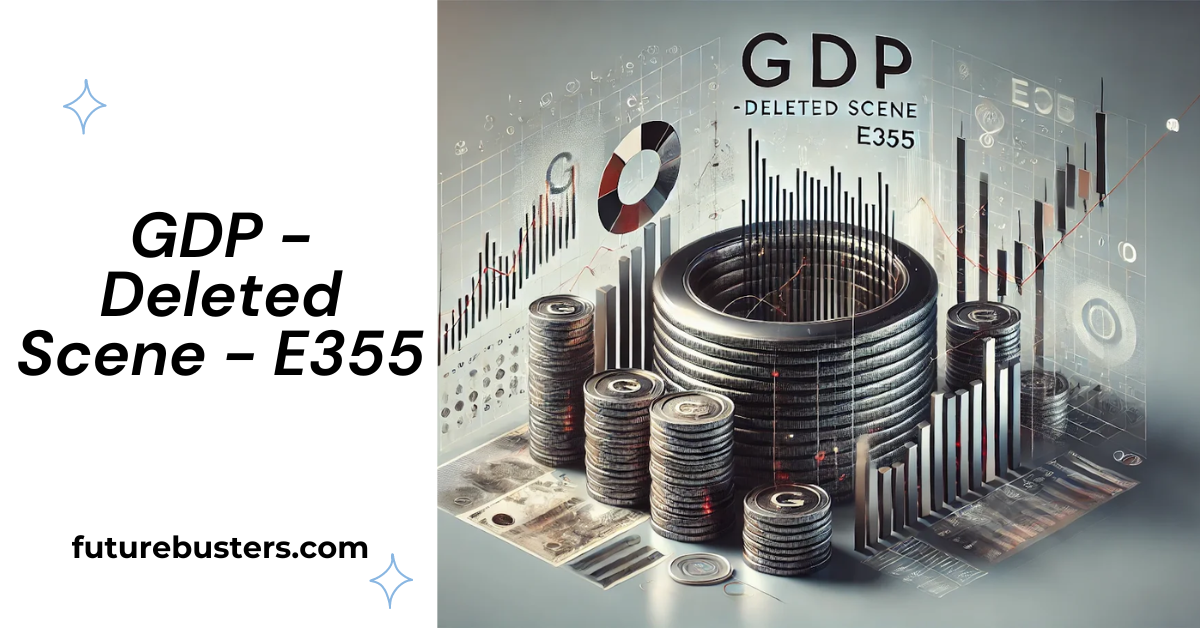GDP – Deleted Scene – E355 : Uncovering the Hidden Layers of Economic Data

Have you ever wondered what lies beneath the surface of those glossy economic reports? Just like your favorite movie’s deleted scenes, there’s a whole world of economic data that never makes it to the big screen of Gross Domestic Product (GDP) figures. Today, we’re diving deep into the fascinating realm of “GDP – Deleted Scene – E355” to explore the hidden stories behind the numbers.
What is GDP – Deleted Scene – E355?
GDP – Deleted Scene – E355 is a metaphorical concept that invites us to look beyond the headline GDP figures and explore the rich tapestry of economic activity that often goes unnoticed. Just as filmmakers leave certain scenes on the cutting room floor, economists and statisticians must make choices about what to include in official GDP calculations.
The “E355” in our title represents the endless possibilities of economic indicators that could potentially be considered. It’s a nod to the complexity and depth of economic life that can’t always be captured in a single number.
Why Does This Matter?
Understanding “GDP – Deleted Scene – E355” is crucial for several reasons:
1. Complete Picture: It helps us grasp the full scope of economic activity, including informal and non-market transactions.
2. Policy Implications: Recognizing these “deleted scenes” can lead to more informed decision-making by policymakers and business leaders.
3. Individual Impact: It shows how our daily activities contribute to the economy, even if they’re not formally counted.
4. Economic Evolution: As economies change, what was once a “deleted scene” might become central to future GDP calculations.
The Main Characters: What Gets Left Out?
Let’s meet some of the key players in our “GDP – Deleted Scene – E355” production:
1. Household Work: The unpaid labor that keeps homes running smoothly.
2. Volunteer Activities: The countless hours people dedicate to helping others without pay.
3. Environmental Impacts: Both positive and negative effects on our natural resources.
4. Quality of Life Factors: Things like leisure time and work-life balance that affect well-being.
5. Underground Economy: Transactions that happen off the books.
6. Digital Economy: New forms of value creation in the online world.
7. Intangible Assets: The growing importance of knowledge, data, and intellectual property.
Household Work: The Unsung Hero
Imagine if we had to pay for every meal cooked at home, every load of laundry washed, or every bedtime story read to a child. The value of household work is enormous, yet it doesn’t show up in GDP calculations. Some estimates suggest that including household work could increase GDP by 20-50%!
Why it matters:
– Recognizes the economic contribution of stay-at-home parents and caregivers
– Highlights gender disparities in unpaid labor
– Could influence social policies and support systems
Volunteer Activities: The Heart of Community
From coaching little league to serving at a soup kitchen, volunteer work forms the backbone of many communities. While these activities create immense social value, they’re another “deleted scene” in the GDP story.
Impact on society:
– Strengthens social bonds and community resilience
– Provides essential services that would otherwise strain public resources
– Develops skills and networks that can benefit the formal economy
Environmental Impacts: The Green-Tinted Lens
Traditional GDP doesn’t account for the depletion of natural resources or the costs of pollution. On the flip side, it also doesn’t capture the value of clean air, pristine forests, or biodiversity.
Why we should care:
– Encourages sustainable development practices
– Helps assess the true cost and benefit of economic activities
– Supports long-term planning for resource management
Quality of Life: Beyond the Paycheck
GDP might tell us how much money is flowing through the economy, but it doesn’t tell us much about how satisfied people are with their lives. Factors like work-life balance, access to education and healthcare, and social connections all contribute to well-being.
What it means for you:
– Encourages a more holistic view of progress
– Can inform policies aimed at improving overall quality of life
– Helps individuals make more balanced life choices
The Underground Economy: Shadows and Whispers
From cash-only businesses to informal bartering, the underground economy represents a significant portion of economic activity in many countries. While some of this activity may be illegal, much of it is simply unreported.
Why it’s significant:
– Can indicate areas where formal economic systems are falling short
– Affects tax revenues and public services
– May provide economic opportunities for marginalized groups
The Digital Frontier: Bits, Bytes, and Value
In our increasingly digital world, how do we measure the value of free apps, social media platforms, or open-source software? The digital economy presents unique challenges for GDP calculation.
What it means for the future:
– Requires new methods of measuring economic value
– Highlights the growing importance of data as an economic asset
– Challenges traditional notions of productivity and work
Intangible Assets: The Invisible Goldmine
In knowledge-based economies, intangible assets like patents, trademarks, and brand value are becoming increasingly important. Yet, these assets are often underrepresented in GDP figures.
Why it matters:
– Reflects the changing nature of value creation in modern economies
– Impacts investment decisions and company valuations
– Challenges traditional economic models and policies
Bringing It All Together: The Director’s Cut
So, what would our economy look like if we included all these “deleted scenes”? While it’s challenging to create a single measure that captures everything, several alternative indicators have been proposed:
1. Genuine Progress Indicator (GPI): Adjusts GDP for environmental and social factors.
2. Human Development Index (HDI): Combines GDP with measures of education and life expectancy.
3. Gross National Happiness (GNH): Pioneered by Bhutan, it includes spiritual and cultural factors.
4. OECD Better Life Index: Allows users to compare well-being across countries based on various factors.
These alternative measures help paint a more complete picture of economic and social progress, giving us a “director’s cut” version of our economic story.
Looking Ahead: The Sequel to GDP
As our understanding of economics evolves, so too must our measurements. The concept of “GDP – Deleted Scene – E355” reminds us that there’s always more to the story than what meets the eye. By considering these hidden aspects of our economy, we can make more informed decisions, create better policies, and work towards a more inclusive and sustainable future.
What You Can Do:
1. Stay Informed: Keep learning about alternative economic measures and what they reveal.
2. Advocate: Support policies that consider a broader range of economic and social factors.
3. Value the Invisible: Recognize the importance of unpaid work and volunteer activities in your community.
4. Think Holistically: Consider quality of life factors alongside financial considerations in your own decision-making.
5. Engage in Discussion: Share these ideas with others to broaden the conversation about economic progress.
Remember, just as a deleted scene can sometimes be the key to understanding a movie’s deeper themes, exploring the “deleted scenes” of GDP can unlock new insights into our complex economic world. By embracing this fuller picture, we can work towards an economy that truly serves everyone.
FAQs About GDP – Deleted Scene – E355
What exactly does “GDP – Deleted Scene – E355” mean?
“GDP – Deleted Scene – E355” is a metaphorical concept that refers to economic activities and factors not included in traditional GDP calculations. It encourages us to look beyond official GDP figures to understand the full scope of economic life.
Why isn’t household work included in GDP?
Household work is typically unpaid and occurs outside the market economy. GDP primarily measures market transactions, making it challenging to value and include household work consistently.
How does the underground economy affect GDP calculations?
The underground economy, consisting of unreported or illegal activities, is not captured in official GDP figures. This can lead to underestimation of actual economic activity, particularly in countries with large informal sectors.
Can environmental impacts ever be positive in GDP terms?
Yes, environmental improvements can positively impact GDP through increased tourism, improved health outcomes, or the development of green technologies. However, traditional GDP doesn’t directly measure environmental quality.
How does the digital economy challenge traditional GDP measurements?
Many digital products and services are free or have non-traditional revenue models, making their economic value difficult to capture in GDP. Additionally, the rapid pace of technological change can outpace updates to economic measurement methods.
Are there any countries that use alternative measures to GDP?
Yes, several countries have experimented with alternative measures. For example, Bhutan uses the Gross National Happiness index, and New Zealand has implemented a “wellbeing budget” that considers factors beyond GDP.
How can understanding “GDP – Deleted Scene – E355” help me personally?
This concept can help you appreciate the full value of your contributions to society, even if they’re not reflected in official economic measures. It can also inform your personal and professional decisions by considering a broader range of factors that contribute to well-being and progress.
Is there a way to calculate my own personal “GDP – Deleted Scene – E355”?
While there’s no standardized method, you can start by keeping track of your unpaid work, volunteer activities, and personal growth. Consider how these activities contribute to your overall well-being and that of your community.
How might future GDP calculations change to include some of these “deleted scenes”?
As economies evolve, GDP measurements are likely to adapt. We may see increased efforts to value unpaid work, account for environmental impacts, and capture the value created in the digital economy.
What are some criticisms of alternative economic measures like GPI or HDI?
Critics argue that these measures can be subjective, difficult to compare across countries, and may not capture all relevant factors. However, proponents argue that they provide a more holistic view of progress than GDP alone.











